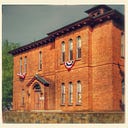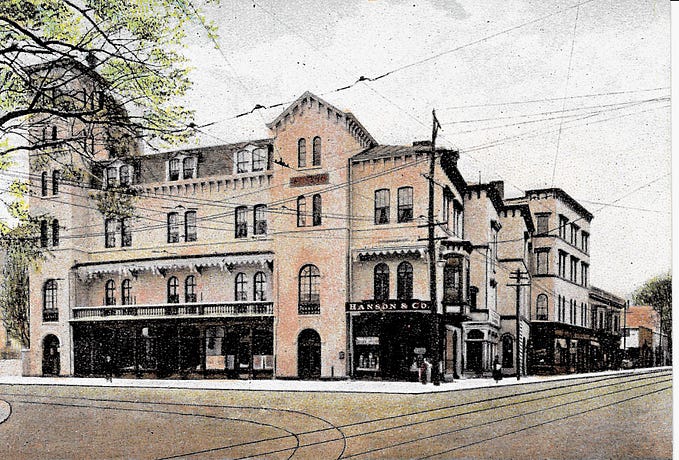River Incidents
By William F. Hanna
In the course of researching the OCHM’s most recent publication, Tetiquet to the Sea: A History of the Taunton River, Katie MacDonald and I came across several bits of information that, while interesting, never made it into the finished manuscript. Leftovers from a simpler time on the river, some are humorous, others are tragic, and a few a just odd, but for some reason they never quite fit into the larger narrative. We’ve decided to resurrect a few of these subjects and we’ll occasionally share them as vignettes in blogs throughout 2024.

The first episode presented here came to us as we gathered material for the chapter dealing with the fishing industry on the Taunton River. Until the early twentieth century, millions of herring returned to the river and its tributaries each spring on their way to spawn in the lakes and ponds where they were born. They were easy to catch and they offered not only food for the locals but also a substantial profit for those who could catch, process, and export them to distant markets.
Almost from the beginning of English settlement, riverside towns set regulations on when, where and by what methods fish could be caught. Eventually, this evolved into a system whereby each town along the Taunton River awarded fishing “privileges” to the highest bidders in an annual auction. Taunton, for example, auctioned only three such licenses each year. The winners — and only the winners — could cast their seine nets into the river between specified hours on certain days of the week. The fishing season usually lasted about six weeks, and the holders of the local privileges, usually well organized, could expect to net hundreds of thousands of herring and shad during that period.

Human nature being what it is, we might wonder if scofflaws ever tried to circumvent the regulations. Of course they did, and a long-defunct newspaper reminds us of the difficulties that sometimes resulted. In December 1897, a writer for the Bristol County Republican recalled an incident that had occurred forty years before. It involved the Water Lily, a pleasant little steamboat that ran picnic excursions from the Weir to Newport. At that time there were bad feelings along the river because, despite warnings from upriver communities, fishermen from Dighton and Somerset persisted in catching fish on days that were prohibited by law. According to the newspaper, men from Middleborough, Taunton and East Taunton finally decided to take matters into their own hands, and a group of about forty men chartered the Water Lily to take them downstream “to clean out all the fishers they could find.”
As so often happens, events did not go as planned. “The Dighton parties got wind of this movement,” recalled the writer, “and prepared to give them a warm reception.” A welcoming committee of ship carpenters awaited the Water Lily, and as it passed a shipyard just below the Berkley-Dighton Bridge, a hail of stones rained down on the Water Lily’s deck. But this was just the beginning, because farther downstream, near Whitmarsh’s store, the steamer passed close enough to the wharf for one of the Dighton men to throw a lasso around the boat’s smokestack. This happened in the vicinity of today’s Taunton Yacht Club, and the rope around its stack allowed men on shore to pull the boat into the dock, where a party of very unhappy down-river men boarded the Water Lily and engaged the invaders in hand-to-hand combat. “The up-river parties got worsted,” said the newspaper, and in the process the steamboat’s stack was pulled completely off the vessel. When last seen, the unlikely man-o’-war’s crew had abandoned ship and taken to the Dighton woods. Sadly for us, the rest of the story has been lost to history.

While the newspaper referred to that affair as an “interesting little comedy,” it’s safe to say that men working in the shipping industry were more acquainted with tragedy than hijinks. Theirs was a dangerous business, as seen by our second episode, which has the steam tugboat Herbert arriving at Weir Village from Somerset on the pleasant morning of June 26, 1877. The powerful tug was operated by the Staples & Phillips Coal Company and it had the barge Advance in tow. The vessel tied up at one of the company’s wharves on the east side of the river, near the Weir Bridge. Its captain, Fred Staples, left for home and the boat’s engineer, Captain Seth Presbrey, attended to chores on the barge. Still aboard the tug were deckhands Willie Paull and Bernard (Barney) Farrell.

At exactly 10 a.m., and without warning, the Herbert was rocked by a thunderous explosion. The blast, said the Taunton Daily Gazette, “shivered the steamer from stem to stern, into thousands of pieces, literally covering the wharf, the street, and the river, with the iron, timber and debris for hundreds of feet, in all directions. . . .” Fragments of heavy, dangerous wreckage showered down upon the streets and businesses of Weir Village. A piece of the tug’s boiler flew through the air and crashed through the roof of one of the nearby stores, while a screwdriver, used aboard the tug, was blasted 200 feet diagonally across the river with such force that it penetrated the wall of a dry goods store on West Water Street. The Boston Evening Transcript reported that the blast was felt a mile away “and rocked houses like an earthquake.”

The two sailors aboard the tugboat were killed instantly. Willie Paull, 21 years old, was the son of a river captain whose home stood on East Water Street, not far from the Staples wharf. A piece of the wreckage landed in Paull’s front yard. The young man was thrown high into the air, over a coal shed and a stable. His flight was interrupted only by the side of a building, almost 400 feet from the wreck of the tug. The body of his shipmate, Farrell, was found more than 100 feet from the scene of the explosion.
Despite a thorough investigation, no cause of the explosion was ever determined. The most likely suspect was the ship’s boiler, but that was relatively new to the tug, and Engineer Presbrey testified that it had been working flawlessly in the days before the disaster.
It took weeks for pieces of the Herbert to be removed from the streets and rooftops of the Weir. The remains of the tug were eventually pulled from the river and carted away, but not before tribute was paid to the two men whose lives had been lost. Staples & Phillips covered the cost of their funerals. Barney Farrell, an Irish immigrant, was kindly remembered for his four-decade work on Taunton River ships, while Willie Paull was mourned as a young man of great promise whose life was tragically brief. As Paull was being buried at East Weir Cemetery, an American flag flew at half-staff on the wreck of the Herbert.
Stand by for more tales of the river in upcoming blogs.








